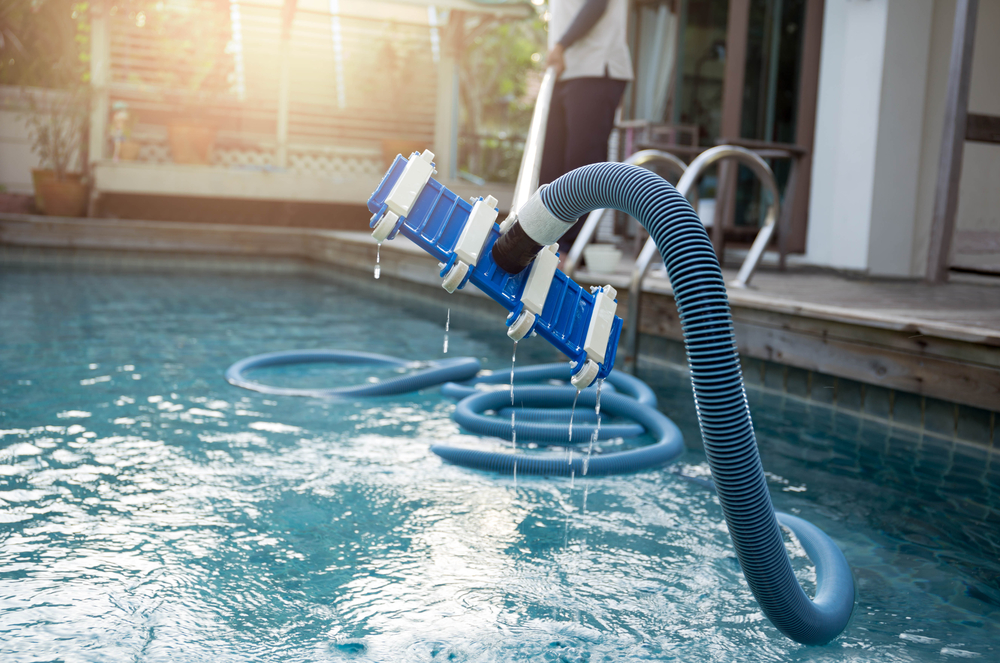As it’s the season where swimming pools tend to get by far the most use, summer is also the time of year when swimming pool care is most vital. Which key areas should you be paying attention to when it comes to swimming pool upkeep as we head into the hot summer?
At Packman’s Pools, our swimming pool contractors are here to provide the best swimming pool construction and maintenance services available around Salt Lake City, Utah and nearby areas. Here are some basic summer pool maintenance tips to ensure your swimming pool is in great shape throughout its busiest season and beyond.

Water Level Maintenance
One of the simplest and most important pool maintenance tasks is keeping the water level at the appropriate height. During hot summer months, water evaporates quickly and can cause the water level to drop below the skimmer intake.
This can lead to pump damage and poor filtration if not addressed promptly. Check your pool’s water level regularly and use a garden hose to add more water as needed.
Chemical Balance
Proper chemical balance in your swimming pool is crucial for ensuring clean and safe water for swimmers. Test your pool’s pH levels at least twice a week using either test strips or a liquid testing kit. The ideal pH range should be between 7.4-7.6, with anything below that being too acidic and anything above being too basic.
If your pH levels are too high, you can add muriatic acid to lower them. If they are too low, use sodium carbonate (soda ash) to raise them. Remember to always follow the manufacturer’s instructions when adding chemicals and never mix different types of chemicals together.
In addition to pH, chemicals like chlorine and bromine are also important for maintaining a clean and sanitary pool. Chlorine is the most commonly used chemical in pools and helps to kill bacteria, algae, and other contaminants. Bromine is an alternative to chlorine that may be better suited for indoor pools or hot tubs as it is more stable in higher temperatures.
Filter Considerations
When it comes to pool cleanliness and maintenance, the filter is an essential component. There are three main types of filters used in pools: sand, cartridge, and diatomaceous earth (DE). Each type has its own advantages and disadvantages, so it’s important to understand the differences before choosing one for your pool.
Furthermore, it’s important to take proper care of your filter to ensure it functions effectively. Regularly cleaning or replacing the filter as recommended by the manufacturer is crucial in maintaining a clean and safe pool.
Vacuuming and Cleaning
Periodically, your pool will need to be vacuumed and cleaned to remove debris and maintain proper water chemistry. This is especially important after heavy use or during peak swimming season. The type of filter you have will determine the best method for cleaning your pool.
For sand filters, backwashing is the most common way to clean it. This involves reversing the flow of water through the filter to flush out any trapped debris. Make sure to check and follow your manufacturer’s instructions on how often this should be done.
For cartridge filters, removing and manually cleaning the cartridges is necessary. They can also be replaced when they become too dirty or worn out. Again, refer to your manufacturer’s recommendations for how often this should be done.
And for DE filters, a process called “bumping” can help dislodge trapped debris from the filter grids. This involves gently hitting or tapping the sides of the filter while the pump is off. However, regular deep cleaning and replacing of DE powder is still necessary. Consult your manufacturer’s instructions for frequency.
Shocking the Pool
For many pool owners, shocking their pool is a familiar task. This process involves adding a high dose of chlorine or other oxidizing agent to the water in order to kill harmful bacteria and algae. It is important to shock your pool regularly, especially after heavy usage or periods of rain.
There are different types of shock treatments available on the market, so it’s important to read the labels carefully and choose one that is appropriate for your specific type of pool and its needs.
As you can see, there are several basic considerations when it comes to summer care for your swimming pool. For more here, or to learn about any of our swimming pool construction, maintenance or other services from our swimming pool contractors, contact us at Packman’s Pools today!


